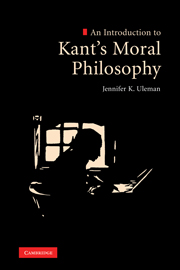Book contents
- Frontmatter
- Contents
- Acknowledgements
- 1 Introduction: the strange thing
- 2 A sketch of Kantian will: desire and the human subject
- 3 A sketch continued: the structure of practical reason
- 4 A sketch completed: freedom
- 5 Against nature: Kant's argumentative strategy
- 6 The categorical imperative: free will willing itself
- 7 What's so good about the good Kantian will? The appeals of the strange thing
- 8 Conclusion: Kant and the goodness of the good will
- Bibliography
- Index
8 - Conclusion: Kant and the goodness of the good will
Published online by Cambridge University Press: 05 June 2012
- Frontmatter
- Contents
- Acknowledgements
- 1 Introduction: the strange thing
- 2 A sketch of Kantian will: desire and the human subject
- 3 A sketch continued: the structure of practical reason
- 4 A sketch completed: freedom
- 5 Against nature: Kant's argumentative strategy
- 6 The categorical imperative: free will willing itself
- 7 What's so good about the good Kantian will? The appeals of the strange thing
- 8 Conclusion: Kant and the goodness of the good will
- Bibliography
- Index
Summary
There are times in philosophy, as in life, when the way a problem is framed, the way the alternatives are formulated, makes you feel like your head is going to explode. This was the case for me when, in college, I first encountered John Rawls' effort to separate the political from the moral, and found others echoing, as though it were unproblematic and even helpful, a distinction between ‘the right’ and ‘the good.’ The former was meant to be impersonal and somehow suited for public institutions, a matter of ground rules and shared principles, and of duties to which there could not be exceptions, while the latter was best articulated and pursued in ways that were personal and private, an ideal suited to, say, intimate relationships where sensitivity and particularity were called for. What were these people talking about? Connections were drawn to ‘liberal neutrality,’ to the attractions of a conception of right able to accommodate ‘competing conceptions of the good’; those critical of abstract descriptions of right championed Habermas' ‘more grounded’ approach. But, I thought, isn't the right only right because it is in some important sense good? How could there be a political (public, juridical, institutional) vision that isn't based on (designed to accommodate, realize, and/or protect) some moral conception of human flourishing?
I realize that blame for mapping the terrain of practical philosophy in ways that segregated ‘good’ and ‘right’ probably should not all be heaped on Rawls.
- Type
- Chapter
- Information
- An Introduction to Kant's Moral Philosophy , pp. 175 - 179Publisher: Cambridge University PressPrint publication year: 2010



